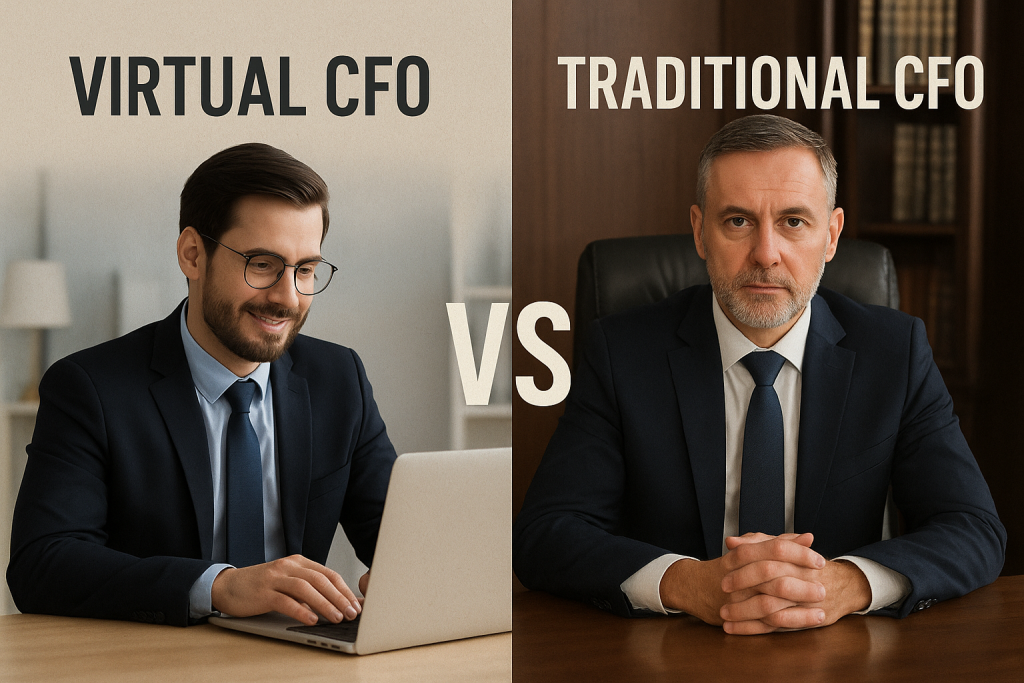Virtual CFO vs Traditional CFO: Which is Right for Your Startup in 2025?

Startups in India face increasingly complex financial challenges while operating on limited resources. The critical question many founders grapple with is whether to invest in a traditional CFO or leverage virtual CFO services. With the virtual CFO market in India expected to grow at 15.6% CAGR through 2030, understanding this decision framework is essential for startup success.
Understanding the Financial Leadership Landscape
What is a Traditional CFO?
A traditional CFO is a full-time, in-house executive who provides comprehensive financial leadership. These professionals typically work on-site, manage internal teams, and maintain deep involvement in daily operations. Traditional CFOs represent a significant long-term commitment, offering strategic oversight combined with hands-on management of financial functions.
What is a Virtual CFO?
A Virtual CFO operates remotely, providing strategic financial expertise on a part-time or project basis. They leverage cloud-based tools and digital platforms to deliver CFO-level services without the overhead of a full-time hire. Virtual CFOs typically work with multiple clients, bringing diverse industry experience to each engagement.
Comprehensive Cost Analysis
Traditional CFO Investment
The financial commitment for a traditional CFO in India is substantial:
Annual Costs:
- Salary Range: ₹25-80 lakhs per year
- Startup CFOs: ₹50 lakhs – ₹2 crores annually
- Additional Expenses:
- Performance bonuses and ESOPs
- Employee benefits (medical insurance, PF, gratuity)
- Office infrastructure and equipment
- Recruitment and training costs
Total Investment: ₹40-100+ lakhs annually when including all overhead costs.
Virtual CFO Investment
Virtual CFO services offer significantly more accessible pricing:
Pricing Models:
- Early-stage startups: ₹7,000-15,000 per month
- Growing SMEs: ₹20,000-40,000 per month
- Complex businesses: ₹50,000+ per month
- Hourly rates: ₹2,500-7,000 per hour
Annual Investment: ₹3-20 lakhs typically, representing 50-75% cost savings compared to traditional CFOs.
Service Comparison Framework
Service Area | Traditional CFO | Virtual CFO |
Strategic Planning | Deep, company-specific strategies | Cross-industry insights and best practices |
Daily Operations | Full-time oversight and management | Strategic oversight with periodic reviews |
Team Management | Direct leadership of finance teams | Collaborative approach with existing staff |
Technology Integration | Varies based on company resources | Latest enterprise-grade tools included |
Compliance Management | In-house expertise development | Ready expertise across regulations |
Fundraising Support | Single company focus | Multi-client fundraising experience |
Scalability | Fixed commitment regardless of needs | Flexible engagement based on requirements |
Decision Framework for Startups
Choose a Virtual CFO When:
Financial Constraints Exist
- Annual revenue below ₹50 crores
- Cannot justify ₹40+ lakhs CFO salary
- Need expertise without long-term commitment
Growth Stage Considerations
- Pre-Series A or early-stage startups
- Businesses with fluctuating financial needs
- Companies requiring specialized expertise for specific projects
Operational Requirements
- Remote-first business model
- Need for cross-industry insights
- Requirement for latest financial technology
Choose a Traditional CFO When:
Business Complexity
- Multiple subsidiaries or business units
- Complex regulatory environment
- Daily financial decision-making requirements
Scale and Resources
- Annual revenue exceeding ₹100 crores
- Ability to support full-time executive salary
- Need for constant strategic oversight
Long-term Stability
- Established business model
- Consistent financial leadership requirements
- Internal team management needs
ROI and Performance Benefits
Virtual CFO ROI Metrics
Research indicates significant returns on Virtual CFO investments:
- Marketing ROI improvement: 25% through optimized fund allocation
- Fundraising success: 40% higher likelihood of securing early-stage funding
- Cost optimization: Identification and elimination of wasteful spending
- Compliance savings: Reduced penalties and legal issues
Traditional CFO Value Proposition
Traditional CFOs provide value through:
- Institutional knowledge: Deep understanding of company-specific challenges
- Team development: Building internal financial capabilities
- Strategic continuity: Long-term strategic planning and execution
- Operational efficiency: Daily oversight of financial operations
Implementation Considerations
Virtual CFO Implementation
Timeline: 1-2 weeks typical engagement start
Setup Requirements:
- Cloud-based accounting systems
- Digital communication tools
- Defined service level agreements
- Performance metrics and KPIs
Traditional CFO Hiring
Timeline: 2-4 months recruitment process
Setup Requirements:
- Comprehensive compensation package design
- Office infrastructure preparation
- Team integration planning
- Long-term strategic alignment
Technology and Innovation Impact
Virtual CFOs leverage advanced technology more effectively:
- Cloud-based financial platforms for real-time reporting
- AI-powered analytics for strategic insights
- Automated compliance tools for regulatory management
- Digital dashboards for stakeholder communication
Traditional CFOs may rely on legacy systems, potentially limiting agility in rapidly evolving business environments.
Risk Assessment
Virtual CFO Risks
- Potential communication gaps due to remote nature
- Limited availability during critical periods
- Less intimate knowledge of company culture
- Dependency on digital infrastructure
Traditional CFO Risks
- High financial commitment with limited flexibility
- Single point of failure if hiring decision is poor
- Potential over-investment in early-stage companies
- Limited cross-industry perspective
Industry Trends and Future Outlook
The Indian startup ecosystem is increasingly embracing virtual CFO services. Key trends include:
- Government support for MSME digitization through automation grants
- Enhanced regulatory frameworks requiring sophisticated financial management
- Investor expectations for professional financial leadership regardless of company size
- Technology advancement making remote CFO services more effective
Making the Right Choice
For most startups in 2025, virtual CFO services represent the optimal balance of expertise, cost-effectiveness, and flexibility. The decision should be based on:
- Current financial resources and runway
- Complexity of business operations
- Growth stage and scaling requirements
- Industry-specific regulatory needs
- Long-term strategic objectives
Virtual CFOs are particularly suited for startups seeking professional financial leadership without the commitment of a full-time hire, while traditional CFOs remain valuable for larger, more complex organizations requiring daily strategic oversight.
The choice between virtual and traditional CFO services will ultimately depend on your startup’s specific circumstances, but the growing trend toward virtual CFO adoption reflects their effectiveness in providing strategic financial leadership for modern businesses operating in an increasingly digital economy.
Get Expert Assistance
Recent Articles
 Related Party Transactions in a Private Limited Company: What Every Board Must Get Right
Related Party Transactions in a Private Limited Company: What Every Board Must Get Right Conversion of External Commercial Borrowings (ECB) into Equity: A Strategic Guide for Indian Companies
Conversion of External Commercial Borrowings (ECB) into Equity: A Strategic Guide for Indian Companies OSH Code 2020 Guide: India Workplace Safety for Employers & Workers
OSH Code 2020 Guide: India Workplace Safety for Employers & Workers 90 Days Work Rule for Gig Workers: Everything You Need to Know About India’s New Social Security Framework (2026)
90 Days Work Rule for Gig Workers: Everything You Need to Know About India’s New Social Security Framework (2026) Stop Filing Director KYC Every Year: New Once in 3 Years Rule Starts March 2026
Stop Filing Director KYC Every Year: New Once in 3 Years Rule Starts March 2026
Contact Us
- 50, Bright Arcade, 12th Main Rd, 4th T Block East, KV Layout, Jayanagar, Bengaluru – 560011, Karnataka
- +91 97397 36999
- mgmt@chhotacfo.com
Useful Links
©2024.CHHOTA CFO - All rights reserved






